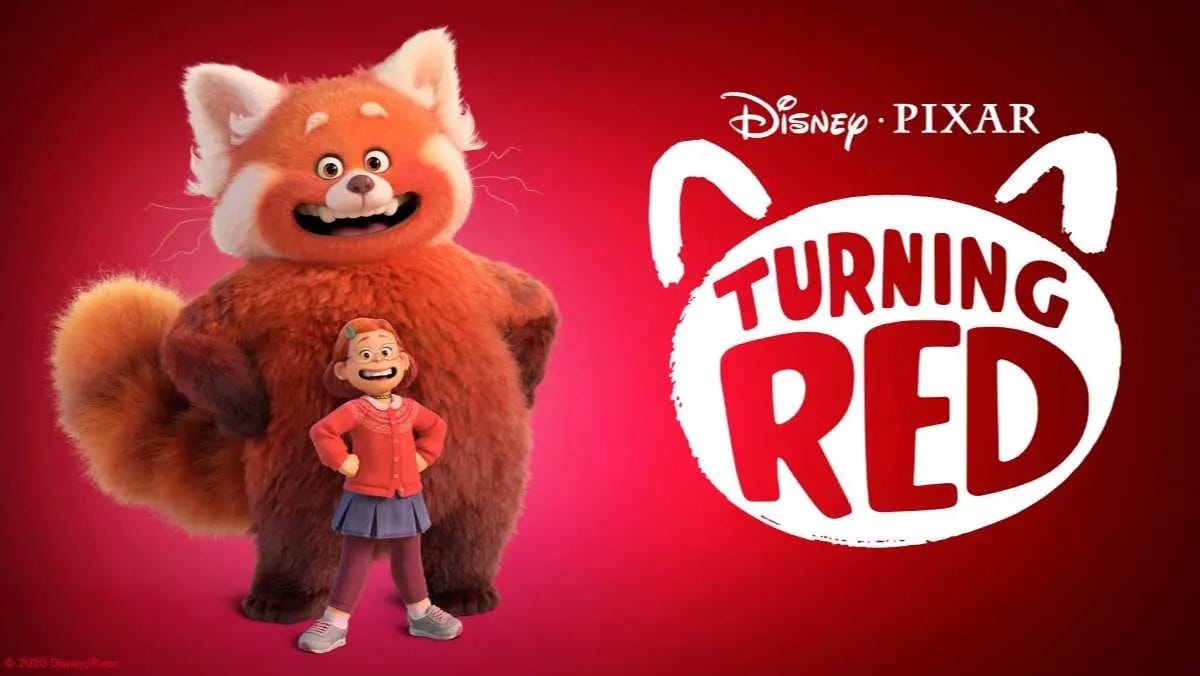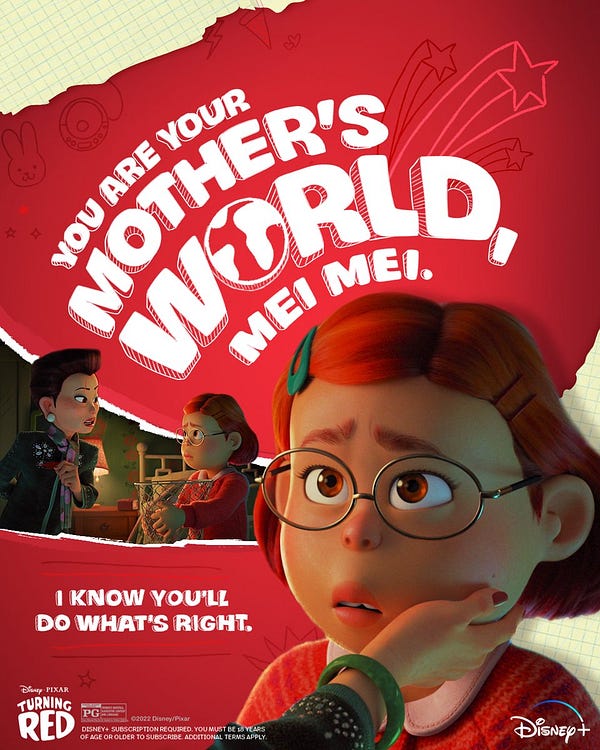Self-Actualization Is Not the Sole Purpose of Human Existence
in fact it's fully bullshit, IMO
Book Club participants, I’m very sorry there was no post yesterday. I’ve gotten a bit behind. The post will be up tonight or, at the latest, Friday afternoon.
I didn’t care much for Turning Red, the recent Disney/Pixar movie about a young Chinese-Canadian girl who suffers from an ancestral curse that turns her into a giant red panda when she gets emotional. (The curse, as you might predict, turns out to be a blessing.) I found the main character a little annoying, and it’s a good example of a movie that tries so hard to play to current youth sensibilities that it will inevitably seem incredibly dated in a few years. Mostly, though, I’m annoyed by yet another piece of pop culture that acts as though being validated and self-actualized is the noblest of human endeavors.
In the movie, protagonist Mei struggles under the weight of her mother Ming’s exacting expectations while trying to be a fun-loving Zoomer Torontonian. The red panda curse expresses itself thanks to her repression and frustration at her mother’s expectations. This is pretty standard-issue teen stuff, though the movie takes considerable care to invoke the cultural elements at play. I don’t mind that Mei wants to break free from the weight of restrictive parenting; that’s what it’s like being an adolescent. I don’t even mind that the movie roots for Mei to gain more independence. What I find remarkable, and quite sad, is that there seems to me to be no sense in which Mei is expected to meet her mother in the middle. The movie harbors no belief that Ming has a right to her own expectations about Mei’s conduct, no sympathy for the idea that perhaps Mei has a responsibility to her mother just as her mother has a responsibility to her. Mei wants to live the life that Mei wants to live, and as far as the movie is concerned that is the only issue of concern. That other people exist is not Mei’s problem.
Indeed, the only nod to the legitimacy of Ming’s position is to show that she too was once a repressed young woman, that she too labored under the burden of a mother’s expectations. There’s no suggestion that Ming’s concerns could be valid even when they conflict with Mei’s. The only bone they’ll throw to Ming is to let her be the victim of a denial of self-actualization too. You might think that parenting sometimes involves not giving children what they want, and that a big part of becoming an adult is recognizing that there are higher priorities than getting what we feel we're entitled to. But the dictates of our current cultural conversation insist that anything that restricts the whims of the individual is by definition the hand of injustice.
There's a triumphant moment where Mei acknowledges that she has been behind some of the schemes that have angered her mother, but the triumph is not that she has come clean and taken responsibility. No, it's a triumph only because she's stood up to her mother. She's utterly unapologetic about deceiving her mother and manipulating her friends.
It would have taken just a little tweaking for the script to make a far more balanced and compassionate approach towards Ming, to demonstrate that freedom is only a valuable ideal if paired with duty. But Turning Red is about the journey to self-actualization, and like so much of our culture the movie is so convinced that this is the only journey worth going on it never bothers to justify that position. We are supposed to already know that validation of the self, becoming convinced that everything about you is just as it should be, is the purpose of human striving. That there’s no room for other people in this vision of the right life is the kind of detail we take pains to ignore in 2022.
Longtime readers will know that I maintain a morbid fascination with inspirational Instagram memes, truly a cursed genre. They represent a vision of human flourishing based on the notion that healthy, well-adjusted people are possessed of absolutely deranged self-confidence and pursue their desires with remorseless and violent ambition. It’s a nightmare, man, an army of 20-something women telling each other that the way to enjoy a healthy and satisfied life is to insist that you deserve every last thing you’ve ever desired and then “manifest” those desires into being. It’s a terribly cruel thing to teach people, given that life will never, ever fulfill those lofty expectations. But it’s also straight-up Ayn Rand shit, libertarian me-first propaganda laundered through a vaguely social justicey philosophy that says some people’s selfishness is to be celebrated. I’m afraid you can’t get to a more progressive society by teaching people that their only concern should be maximizing their own personal desires.
I can't emphasize enough: it's not at all clear to me that anyone walks around with the kind of overpowering self-acceptance that's now normalized as a goal. I suppose some people just happen to enjoy such an attitude by a quirk of brain chemistry, but most successful, happy, healthy people walk around with the same self-doubt and insecurity as the rest of us. And maybe that's a good thing.
What happens when doing what’s right and being true to yourself are contradictory goals? I pointed out years ago that one fundamental problem with all of this self-actualization is that sometimes life really is zero-sum. If one boss bitch wants a promotion but another boss bitch wants it too, then they can’t both be self-actualized; if two people both want to date the same person, one of them is going to find themselves unvalidated. The simplest argument against a cultural fixation on the individual getting whatever they want is that it’s entirely unachievable. But the deeper and more important problem is that several thousand years of human progress has advanced in the direction of the common good rather than of the selfish individual. We owe each other things, and sometimes this means sacrificing our own wants and desires to support others. Like bending a little to satisfy the expectations of the woman who gave you life. If a dogged insistence that the individual’s wants are ultimately of less importance than the greater good of the whole is actually a part of Chinese culture, as suggested by this movie, I think that’s something worth defending, not treating like a cartoon villain.






This might sound trite, but as someone who has that quirk of brain chemistry or whatever it is to have lived a life relatively free of self doubt and certainly free of significant mental health issues; one of the things I've come to understand is that my healthy sense of self is not because I'm full of positive self-talk and focused on self-actualisation. It's because I don't really think about myself much at all.
Without wanting to sound insensitive, and acknowledging the many people with genuine diagnosable mental health issues, so many people would do well to just stop thinking of themselves as the world's Main Character. Trust me, life gets a lot better when you do.
This touches on something I've been thinking lately. In my opinion, much of our current political squabbles have an underlying thread that is rarely touched on and that is narcissism. Seems as though everyone expects everyone else to re-arrange their lives to ensure they do not suffer the slightest indiscretion. Likewise, there seems to be a dearth of humility these days with very few people even entertaining the notion that they might be wrong about something.
Really not sure where this came from. Maybe this is the culmination of the self esteem movement that began in the 80s/90s? Regardless, seems like everyone these days simply refuses to engage with anyone or anything that might dent their ego in any way.